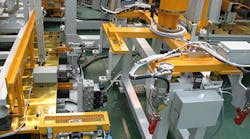Orders placed with U.S. factories for business equipment rebounded in April even as the prior month’s figure was revised downward, indicating resilient demand at the start of the second quarter, Commerce Department figures showed on May 25.
Non-military capital goods orders excluding aircraft rose 1% m/m (est. 0.7% gain) after falling 0.9% the prior month (revised from 0.4% drop). Shipments of those goods, used to calculate gross domestic product, rose 0.8% (est. 0.4% increase) after a revised 0.7% decrease (prev. 0.8% drop)
Excluding transportation-equipment demand, which is volatile, durable-goods orders rose 0.9% (median estimate 0.5% gain) after upwardly revised 0.4 % gain
Orders for machinery fell 0.8% following a 3.2% drop Motor vehicles and parts orders were up 1.8%; electrical equipment, appliances and parts advanced 2.6%.
Fabricated-metal product orders rose 2%, primary metals up 1.3 %.
Durable goods inventories rose 0.3%.
Defense capital-goods orders increased 3.1% following 21.2% plunge
Bookings for all durable goods, or items meant to last at least three years, fell 1.7% (est. 1.3% drop) following a 2.7% increase
Outside of declines in machinery and civilian aircraft, the gain in orders was fairly broad-based, spanning computers, electrical equipment and metals. While the figures are typically volatile, the latest report indicates business spending continues to expand at a healthy pace.
Business investment, joining consumer spending, may help support a projected rebound in economic growth this quarter as demand gets a boost from lower taxes for companies and individuals. At the same time, rising input costs, along with President Donald Trump’s tariffs on imported metals and threats of other levies, pose risks for corporations’ investment plans.
Aircraft orders weighed on total bookings: Boeing Co., the Chicago-based aerospace company, said it got 78 orders for aircraft in April, down from 197 the prior month. The report showed that orders for civilian aircraft and parts fell 29% in April after surging 60.7% in March.
By Shobhana Chandra



